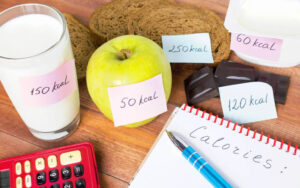Fat Loss & Food Journaling – is it really worth your time & effort?
If you struggle with fat loss or muscle gain even though you hit the gym and/or exercise everyday, there is a good chance that your nutrition or “diet” is one of the main reasons.
Are you eating more than you think?
It is possible that you are underestimating how often you…..
- Hit your calorie, portion, or macros target during the week, but massively surpass it on the weekends.
- Mindlessly overeat whilst watching TV or while socialising.
- Underestimate calories from take out or restaurant meals, alcohol, desserts, cooking oils, and added sugars.
- Forget about small snacks throughout the day.
- Develop amnesia after eating foods that trigger your guilt.
Benefits of keeping a food journal
Keeping a food journal can help massively increase your weight loss, or muscle gain if that is your goal. It is good for other things too.
Food journaling can help you narrow down any food that may be causing digestive issues, disrupting your sleep, or causing those afternoon energy crashes.
The act of journaling what you eat and drink, (and even just knowing that you will be tracking the trail mix) makes you more mindful of your consumption.
It is an excellent way to learn invaluable details about your relationship with food, and to remind yourself what you otherwise mindlessly munched on today.
This allows for accountability, but on your own terms. A buddy-system can be additionally helpful, so consider comparing notes with a friend.
Great tools for journaling
There are some great apps to make journaling a lot quicker and easier. A good one that is easy to use is MyFitnessPal.
The benefit of tracking digitally is that you can automate things (like saving meals or favourite foods) and save a lot of time. You can also use the scan option which will bring up the nutritional values of pre packaged foods without you having to search
If you would rather not track calories but still want to get an idea of your food intake for the day, good old-fashioned pen and paper is great too, or a Doc or Spreadsheet on your phone, ipad etc is great as it is accessible any time.
You could even document your eating in photos, to help you to become more aware of what you are eating throughout the day including all those small snacks or nibbles, like the leftover crust from your kid’s toastie etc.
Some Tips to Think About
Be honest! Not writing it down is just denial. (But if you do fib, you’re not alone: we tend to underestimate our calorie intake by up to 40%.)
It’s not all about the calories. Try tracking other things you care about or are working on, like sugar intake, energy fluctuations, sleep patterns etc.
Tracking progress can be really motivating, in the same way that running a faster 5kms or lifting a heavier weight can be.
Consider recording how you feel, too. This ensures that it’s not just about calories (because it’s not!) but a more holistic look at your relationship with food. You can learn so much, like, that gluten-free bread might actually be causing your bloating. Avocados make you feel more full than meat. Breakfast is okay to skip because you would rather have your smoothie in the afternoon when you are in the mood for a treat.
Do not get caught up in the measurement details. It is better to estimate than to not journal at all. If you are not sure how many grams/mls something is, or what exactly is in the cafe bought smoothie, taking your best guess is allowed. So is asking what is in what you are ordering.
Keep consistent and do not give up, remember this is a new habit which takes time to form. Just remember that it is much harder to start a new habit than it is to maintain it.
Can I fit this extra task into my day
Finding time in your busy schedule can be hard when you want to start food journaling.
The very start of food journaling is the biggest time-investment, but as you go, and especially with apps, it becomes a lot easier and quicker.
A good idea is to log your food as you are preparing it as you have all the ingredients handy, or immediately after you have eaten it before you forget. Waiting until the end of the day guarantees missed meals or food amnesia (which is actually a thing).
If you are using an app such as MyFitnessPal it does take a bit of time to log individual items when you first start but as your database of favourite foods grows it becomes quick and easy to use.
The best time to start is NOW !
I guarantee you will learn something new about yourself, it may even help with the Fat loss if that’s what you’re aiming for.

